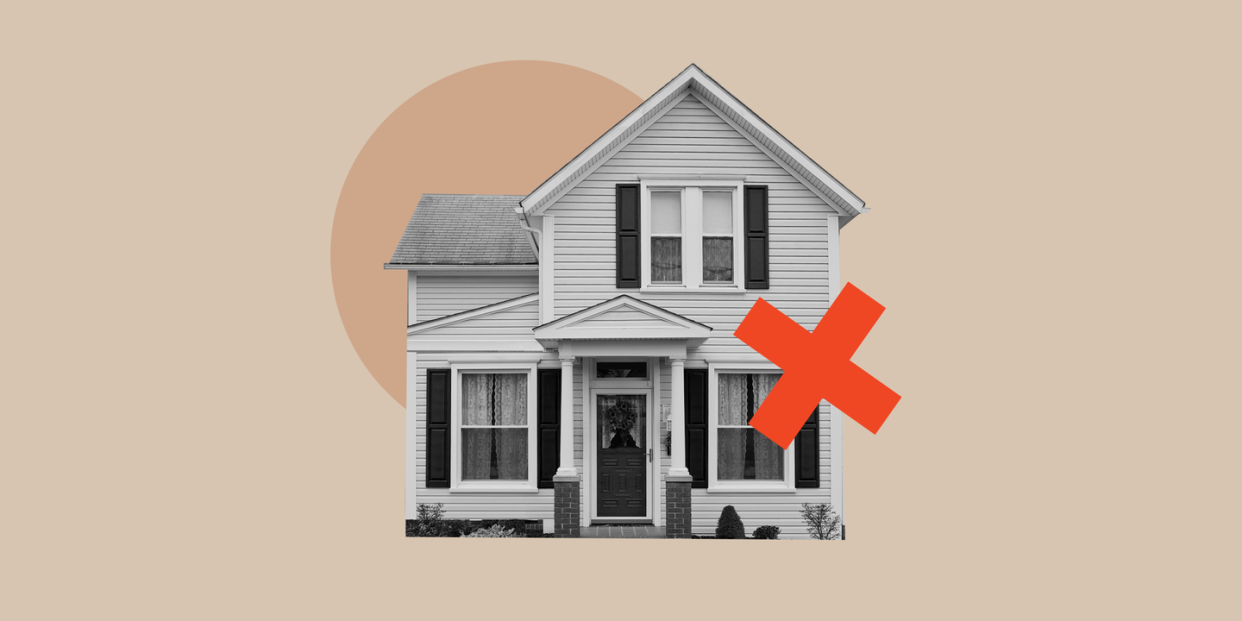What You Need to Know if Your Landlord Tries to Evict You

The coronavirus pandemic has unveiled all the cracks in the American housing system as millions of Americans still find themselves without income, facing eviction, and left with months of backlogged rent. But on Sept. 1, the CDC put forth an order that banned evictions related to COVID-19 loss of income for the rest of the year.
This is obviously a relief to so many people who have lost wages since the pandemic began, but it likely won’t stop landlords from illegally trying to evict tenants regardless of the situation. (Ahem, slumlords abound.) So, if your landlord pulls any crap on you and tries to send you packing even if you qualify for the eviction moratorium, here’s a rundown of what you can do:
Know! Your! Tenant! Rights!
Like car salesmen (sorry) or a MLM pyramid schemer (not sorry), many individuals in positions of power rely on your lack of knowledge to push their agendas through—even if they’re illegal. So take note: every renter has rights. Head to the National Housing Law Project, which will help you learn what kind of rights you have based on where you live. You'll find a map of state moratorium laws and a template you can use to file a complaint against your landlord for unlawfully filing an eviction.
But here's the deal for everyone: landlords are required to give tenants 30 days' notice before filing an eviction complaint in court. It’s important to note a notice is not an eviction. Your landlord cannot force you to evict out of the blue. They also can’t lock you out, remove your belongings, cut off your utilities, or refuse to make necessary repairs. If they do, you can call Statewide Legal Services at 1-800-453-3320 or your local housing code enforcement office.
Document Everything
In order to qualify for the moratorium, as the New York Times reported, tenants must be able to prove substantial loss of household income, the inability to pay full rent, and best efforts to pay partial rent due to COVID-19. The ban also requires tenants to prove an income of $198,000 or less for couples filing taxes jointly, or up to $99,000 if you're riding solo. Additionally, tenants must also stipulate that eviction would likely leave them to experience homelessness or break socially distancing orders. According to CBS, "Local courts would still resolve disputes between renters and landowners about whether the moratorium applies in a particular case." You can file for the moratorium by going to your county website.
Some landlords are more lenient than others. "A lot of landlords are willing to work with people in this situation. They would rather keep a tenant who can pay less than try to get someone new in,” Shamus Roller, executive director of the National Housing Law Project, told the Washington Post.
If you're talking to your landlord about anything related to pausing your rent or a potential eviction, document any and all communication. This means you should save all your emails, make notes after phone calls, screenshot DMs, or even videotape interaction. You'll need this if—gulp—your situation goes to court.
Get (Free) Help
OK, yes there's a very unlikely but also pretty scary scenario in which your landlord takes you to court over an eviction. If you receive a court notice, be sure to show up (whether virtually or in-person with social distancing rules) or else the judge may rule in the landlord’s favor by default.
That being said, legal help can be extremely expensive (hence why most tenants don't even take it this far), but depending on where you live, you may be entitled to free legal housing help. There are also a number of firms who are working pro-bono to help tenants navigate nightmare situations with their landlords. For example, California has a pro-bono guide and some states, like South Carolina, have a toll-free hotline for eviction and housing related calls.
Plan for Post-Moratorium
As of right now, the CDC order extends until the end of the year. But a moratorium does not mean the backlog of rent is gone forever. It simply means your landlord cannot evict you because of missed payments during this time, even as your rent continues to accumulate.
Some, but obvi not all, landlords are waiving late fees, but it's best to plan ahead for when the moratorium ends. If you’re struggling to cover rent, a number of cities and states have rental-assistance programs (Houston, for example, just extended their deadline for renters to apply.) It is unclear whether the government will provide more financial assistance as the pandemic continues, but a quick Google search of "[your city] + rent relief" should help point you in the right direction.
Every renter’s situation is undoubtedly different, but understanding what you’re up against gives you an advantage to protecting yourself from unlawful eviction. And until housing becomes a right for all Americans, let's just hope you don't get wind up with landlords like this.
You Might Also Like

